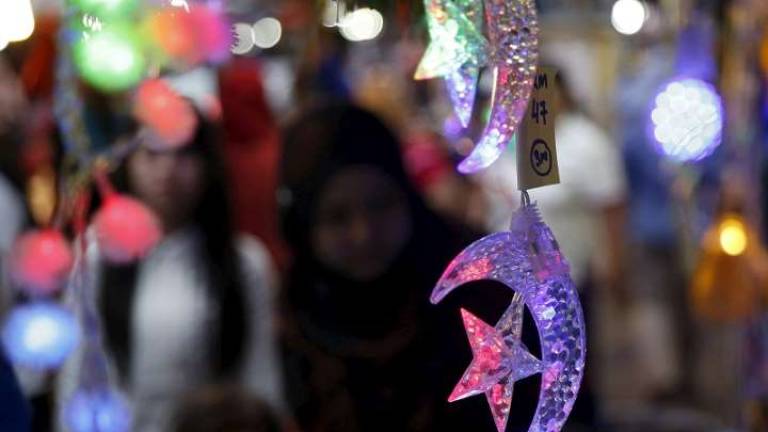KUALA LUMPUR: When it comes to Hari Raya, it is hard to break with tradition, more so when radio stations play the hugely popular number Balik Kampung composed and sang by the late Datuk Sudirman Haji Arshad.
Civil servant Nur Firdaus Abdul Rahim, 37, will sorely miss her Hari Raya gathering with all her seven siblings and parents at their kampung house in Bota, Perak, but she has come to terms with the fact that there will be no balik kampung this year.
Nur Firdaus, who is single and resides in Ulu Kelang, Selangor, plans to visit her younger sister who lives in Bukit Jalil here on the first day of Raya which is expected to fall on May 24. She also has an older sister staying in Bangi and another in Shah Alam while four other siblings live in Perak.
“This Raya, we have to make an educated decision when it comes to visiting others as we don’t want any new Covid-19 cluster popping up after Hari Raya,” she told Bernama, adding that she has learned to adapt to the new normal way of living since the enforcement of the Movement Control Order on March 18.
Nur Firdaus said when making her Raya visits, she will be taking all the necessary precautions like avoiding crowded places, using a sanitiser and observing social distancing.
“Anyway, this is going to be our new normal because it will take some time for a vaccine to be produced to treat the disease. How long can we remain holed up in our houses due to our fear of the virus?” she asked.
Pointing to Taiwan which has been able to keep its Covid-19 infections low even without imposing any lockdown due to the high level of self-discipline shown by its citizens, Nur Firdaus said Malaysians should take their cue from the Taiwanese and be responsible for their own well-being.
No interstate travel
In his live television address on May 10 to announce the extension of the conditional MCO to June 9, Prime Minister Tan Sri Muhyiddin Yassin said interstate travel would be banned during this period, thus putting paid to city folks’ hopes of spending Hari Raya Aidilfitri at their respective kampungs.
In a jocular vein, the prime minister wished television and radio stations would not play P. Ramlee’s Dendang Perantau often as the song made him feel sad too. This sentimental song is a Hari Raya staple and expresses the feelings of a lonely person pining for his family and home.
“Play Hari Raya songs that will perk up the atmosphere. I watched a song (being performed) on YouTube titled Jange Kelik La Weii. This song is ok,” he said.
Muhyiddin also announced that those celebrating Hari Raya can visit their neighbours and family members living in the same state but only a maximum of 20 people are allowed at any gathering. They will also have to observe the usual protocol such as social distancing, wearing a mask and using a sanitiser.
Meanwhile, Senior Minister (Security Cluster) Datuk Seri Ismail Sabri Yaacob told the media yesterday that Malaysians are only allowed to hold celebrations on the first day of the Aidilfitri, Gawai (on June 1) and Kaamatan (May 30) festivals.
In the case of Hari Raya, visiting is only allowed on the first day with visits limited to the homes of immediate family members, while open houses and large gatherings are strictly prohibited.
‘New normal’ Raya visits
This Hari Raya, the tradition of greeting others with the customary salam (extending both hands and grasping the other person’s hands) or with a kiss on the hand or cheek is certainly not permitted.
Commenting on how people should socialise this coming Hari Raya, senior lecturer at Universiti Kebangsaan Malaysia’s Faculty of Education Dr Ku Suhaila Ku Johari said since small gatherings are allowed, both the host and visitors cannot afford to drop their guard when it comes to protecting themselves against infection as the Covid-19 virus is a “silent enemy”.
“Just because we’ve been allowed to pay our family members a Hari Raya visit doesn’t mean that we can take things easy. We don’t know when and where we will get infected, so this year our Hari Raya celebrations have to be moderate,” she said.
Instead of making surprise visits as is the norm during Hari Raya, she suggested that those intending to visit their family members call them first before visiting.
“It may not be proper for us to visit households that have senior citizens because they shouldn’t be exposed to any risk of infection,” she said.
It is understood that more than 50 percent of Covid-19 fatalities in Malaysia comprised senior citizens aged above 60. Eighty-five percent of these deaths involved patients suffering from non-communicable diseases such as diabetes and hypertension.
Those wishing to host Hari Raya gatherings, albeit on a very small scale, should ensure that their guests observe social distancing, said Ku Suhaila.
“What the host can do is make markings on the floor where the buffet table is placed to indicate a one-metre gap between one person and another. Chairs should also be arranged accordingly.
“It’s also a good idea to get a thermometer ready to take the guests’ temperature and keep a record of their names and phone numbers,” she said, adding that the host should also provide a hand sanitiser and stock up on masks in case a guest turns up without wearing one.
She said the host can also put up creative notices in all corners of the house to remind visitors of the need to adhere to the necessary standard operating procedures.
“Of course, the elders may sometimes get carried away talking to their family members but since we don’t want to hurt their feelings, we can use a humorous approach to gently remind them to observe the SOPs,” she added. -Bernama










